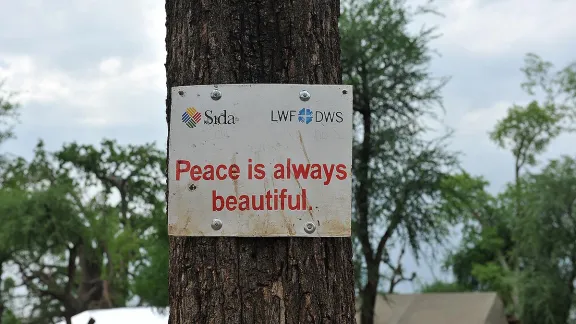
Messages of peace in a school run by LWF in Upper Nile State, South Sudan. Photo: LWF/ C: Kästner
“Humanitarian workers have become soft targets for warring parties”
(LWI) - On World Humanitarian Day, the Lutheran World Federation (LWF) calls for a better protection of humanitarian space. “Humanitarian workers are not targets and must be protected in carrying out their legitimate duties in helping those who need assistance,” says Maria Immonen, director of the LWF humanitarian arm, World Service. “Parties to the conflict need to respect international law and the Geneva Conventions.”
Humanitarian workers are no targets and must be protected in carrying out their legitimate duties in helping those who need assistance. Parties to the conflict need to respect international law and the Geneva Conventions.
Since August 2017, LWF again has witnessed an increase of security incidents in its humanitarian operations. The security situation is especially challenging in South Sudan, but also the Central African Republic, the Democratic Republic of Congo and Ethiopia. LWF has been working in all of these countries for many years, in often hard-to access-locations and with teams of predominantly local staff.
More incidents threatening staff
While the need for humanitarian support has increased, the respect for humanitarian workers has not, Immonen says: “The working environment for LWF as a humanitarian actor has become increasingly insecure. Humanitarian workers have become soft targets for warring parties.” This is especially true for national staff, who work at the front lines and come into regular contact with armed groups. Female aid workers also face additional risks, Immonen adds.
The LWF World Service director is especially concerned about the high number of traumatising incidents, where aid workers have been threatened, intimidated, or even detained. “The psychological impact of those incidents can be very serious,” she says. “Of course car accidents remain the most common security threat, but somehow those kinds of incidents are not usually as difficult to handle emotionally, either by the staff member themselves or colleagues around.”
More resources needed for security
LWF has increased security measures, Immonen says, and worked on preparedness and mitigations plans to provide the best possible protection for staff. The situation however has an impact on operational costs and the ability of humanitarian organizations to provide aid to civilians in conflict areas. “Investing in security costs money which, if we worked in safer environments, we would perhaps be able to spend otherwise, “ Immonen says. “We need to put resources into training, psychosocial care, evacuations, infrastructure etc.” It is also difficult to recruit competent staff for some high-risk locations.
The safety of humanitarian workers, however, is key to being able to provide aid: “We need to keep our staff safe to ensure that we can continue to operate in extremely difficult working environments and reach the communities and victims of war and conflict who continue to live in these conditions.”
LWF World Service is the humanitarian and development arm of the Lutheran World federation (LWF), a communion of 148 churches world wide. LWF has humanitarian and development operations in 28 countries, among them South Sudan, Myanmar, Iraq, CAR, DRC and Colombia. 8,000 mostly national staff provide relief goods, water and sanitation, protection, peace-building and education services to forcibly displaced people and vulnerable communities.
The World Humanitarian Day commemorates a suicide bombing of the UN headquarters in Baghdad, Iraq, on 19 August 2003. 22 people were killed in the attack, which marked a turning point in how the UN and aid groups operate in the field. It was the first time that a neutral international humanitarian organization had been deliberately targeted in such a way.
Join the petition of the United Nations Office for the Coordination of Humanitarian Affairs (UNOCHA) for the protection of aid workers:
- [LWF Mozambique]
- [LWF Middle East]
- [LWF Mauritania]
- [LWF Haiti & the Caribbean]
- [LWF Democratic Republic of the Congo]
- [LWF Asia]
- [ECHO Children of Peace South Sudan]
- [Department for Mission and Development]
- Communion Relations
- Emergency Response
- Humanitarian and development / Country Programs
- Action for Justice


